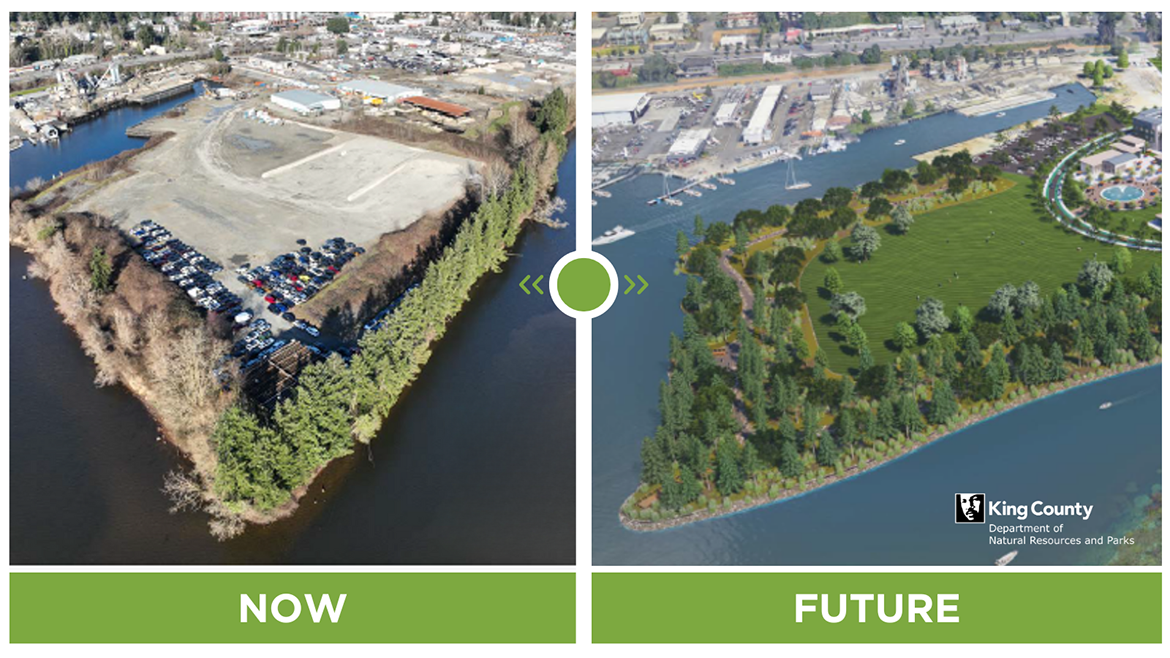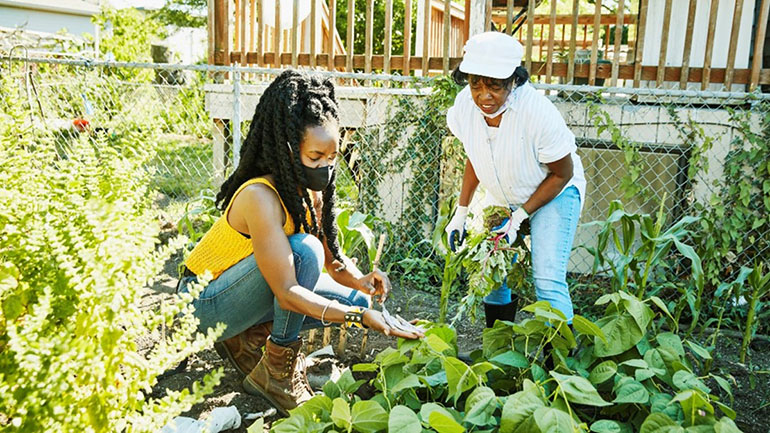Executive Constantine announces $107 million to protect 3,000 acres throughout King County for climate resilience, greenspace expansion, habitat restoration, and farmland access
Summary
Jan. 14, 2025: Fifty-three projects across King County will receive a combined $107 million to protect more than 3,000 acres of open space. It maintains the accelerated pace of land conservation since King County voters approved Executive Constantine’s initiative in 2022 to restore the local Conservation Futures Program to its historic funding rate.
News
King County Executive Dow Constantine today announced $107 million in land conservation awards – approved by the King County Council – that will protect more than 3,000 acres of open space to advance climate resilience, farmland access, environmental justice, recreation access, and habitat restoration.
A few of the 53 projects include helping the City of Auburn build its first downtown park and public space, permanently protecting the lowland forests of Camp Sealth on Vashon Island, creating more greenspace near affordable housing in Seattle’s Georgetown neighborhood, and helping a community-based organization create an urban farm near Sound Transit’s Rainier Beach Station.
The funding package continues the accelerated pace of land conservation in recent years, which is the result of several actions: Voters’ approval in 2022 of Executive Constantine’s initiative to restore the local Conservation Futures Program to its historic funding rate, bonding against future revenues to protect natural areas before they are no longer affordable, and cutting in half the amount of matching funds cities and other partners are required to provide.

“We’re delivering on the commitment I made to the people of King County – to rapidly accelerate land conservation and protect the last, best places, for this generation and for those who will follow,” said Executive Constantine. “Our latest round of countywide investments advances multiple goals – promoting climate resilience, preserving farmland and making it more accessible, restoring fish and wildlife habitat, and even protecting historic summer camps – all of which contribute to our unique quality of life.”
King County now provides funding to help grant recipients protect properties immediately after they complete their purchase agreements so their open spaces remain safe and secure before restoration or construction projects begin. Grant recipients, for example, can now use conservation funding to erect temporary fencing or remove unsafe structures.
Working exclusively with willing landowners, projects that receive funding advance Executive Constantine’s goals established in King County’s Land Conservation Initiative, Strategic Climate Action Plan, Local Food Initiative, and Clean Water Healthy Habitat. The Land Conservation Initiative is a regional partnership to protect the last, best 65,000 acres of urban greenspace, trails, natural lands, river corridors, farmland, and forestland within 30 years.
“It’s been a privilege to work in partnership with Executive Constantine to quadruple annual available funding for our Conservation Futures Program that makes these projects come to life,” said County Councilmember Rod Dembowski. “I’m thrilled that six projects totaling over $12 million in funding in District 1 have been included in this round of funding. Especially exciting is the $7.5 million in Conservation Futures dollars we have secured for Lakepointe in Kenmore, a foundational grant that will transform a legacy industrial waterfront parcel into the crown jewel of Lake Washington public waterfront parks while restoring critical salmon and Kokanee habitat. As our region grows, we must act with urgency to protect our last great forests, farms, open spaces and waterways. The CFT program is the powerful engine that propels our Land Conservation Initiative forward. I look forward to continuing to leverage its capacity to achieve the vision of equitably protecting the 65,000 acres we have prioritized for this critical work.”
Cities and nonprofits creating new urban greenspaces, increasing access to farmland, converting industrial areas into landmark parks
Twenty city and nonprofit projects will receive a combined $33.5 million in Conservation Futures funding, securing the park portion of an affordable housing development, increasing access to recreation where the needs are greatest, and supporting community-based agriculture in communities with limited access to farmland and fresh produce. Highlights include:
- Nurturing Roots’ Empowering Southend Communities through Sustainable Conservation project: Creating an urban farm near Sound Transit’s Rainier Beach Station to anchor their environmental justice work and build food sovereignty in South Seattle.
- Seattle’s Westwood-Highland Park Urban Village acquisition: Combining new open space with future acquisition of repurposed properties owned by the Seattle Department of Transportation to secure a full acre in a rapidly developing neighborhood and provide more park access near White Center.
- Watershed Community Development’s Bend Live/Work District Park: The funding will bring greenspace to Seattle’s industrial Georgetown neighborhood as part of a 100% affordable housing and social services development, geared toward sustaining the livelihoods of local artists and residents.
- Kenmore’s Lakepointe Acquisition: Funding will help the City of Kenmore convert industrial property into a landmark park at the mouth of the Sammamish River, allowing restoration of 3,000 feet of contiguous shoreline.
- Seattle’s North Beacon Hill/Mount Baker Urban Village Acquisitions: Protecting an entire city block of mature urban forest within walking distance of two Sound Transit Link light rail stations.
- Auburn’s Downtown Open Space Addition: Funding will contribute to the City of Auburn’s first downtown park and public space. It will create a unified arts-focused civic plaza that benefits downtown residents and visitors and will serve 750 apartment units within a five-minute walk.

King County projects for forest health, clean water, healthy habitat
Thirty-three projects led by the King County Department of Natural Resources and Parks will receive a total of $73.8 million, which includes $57.8 million in Conservation Futures funding and $16 million in preservation funding generated by the King County Parks Levy. These projects protect and restore critical wildlife habitat, expand county-stewarded parks and trail networks, and create green buffers. Highlights include:
- The second phase of a long-term effort to protect about 400 acres of forest featuring small streams at Union Hill in unincorporated King County between Sammamish and Carnation. Using funds generated by King County’s Forest Carbon Program, this is a rare opportunity to protect a contiguous block of forest that will improve water quality for salmon.
- Expanding a stormwater park/wetland restoration project at Cemetery Pond near Renton that will feature public trail access, viewpoints, and interpretive signage.
- Acquiring 60 acres along Jenkins Creek near Covington, offsetting permitted impacts to wetlands caused by development within the Green/Duwamish Watershed. This lays the foundation for a project to reduce water temperatures and pollution in the salmon-bearing stream.
- Completing the final phase of a long-term effort to protect the lowland forests of the century-old Camp Sealth on Vashon Island. This completes 250 acres of easements at Frog Holler Forest, connecting habitat and permanently preserving the forestland.
Executive Constantine based his funding package on recommendations by the Conservation Futures Advisory Committee, a 16-member volunteer board that reviews each application for open space preservation funding. Committee members represent all nine County Council Districts, including urban and rural communities.
“The Conservation Futures Advisory Committee is proud of this year’s funding recommendations — for people, for salmon, and for the region,” said Catherine Gockel, Chair of the Conservation Futures Advisory Committee. “These acquisitions will help preserve the places that make King County so special: farms, rivers, forests, trails, as well as our cities, and create access to green spaces for all.”
Multimedia
- STORYMAP: Land Conservation Initiative Project Highlights
- TRACKS: An interactive map of environmental stewardship in King County
Resources
- Land Conservation Initiative
- King County Conservation Futures
- Conservation Futures Advisory Committee
- Strategic Climate Action Plan
Quotes
We’re delivering on the commitment I made to the people of King County – to rapidly accelerate land conservation and protect the last, best places, for this generation and for those who will follow. Our latest round of countywide investments advances multiple goals – promoting climate resilience, preserving farmland and making it more accessible, restoring fish and wildlife habitat, and even protecting historic summer camps – all of which contribute to our unique quality of life.
It’s been a privilege to work in partnership with Executive Constantine to quadruple annual available funding for our Conservation Futures Program that makes these projects come to life. I’m thrilled that six projects totaling over $12 million in funding in District 1 have been included in this round of funding. Especially exciting is the $7.5 million in Conservation Futures dollars we have secured for Lakepointe in Kenmore, a foundational grant that will transform a legacy industrial waterfront parcel into the crown jewel of Lake Washington public waterfront parks while restoring critical salmon and Kokanee habitat. As our region grows, we must act with urgency to protect our last great forests, farms, open spaces and waterways. The CFT program is the powerful engine that propels our Land Conservation Initiative forward. I look forward to continuing to leverage its capacity to achieve the vision of equitably protecting the 65,000 acres we have prioritized for this critical work.
The Conservation Futures Advisory Committee is proud of this year’s funding recommendations— for people, for salmon, and for the region. These acquisitions will help preserve the places that make King County so special: farms, rivers, forests, trails, as well as our cities, and create access to green spaces for all.
King County's ongoing efforts to care for our environment through the Conservation Future program will have a lasting impact for generations to come. By preserving open spaces, safeguarding our water sources, and protecting farmland, the program ensures that all residents — regardless of their ZIP code — can enjoy and benefit from these natural resources. Most importantly, it addresses historical inequities by supporting youth, families, and elders in urban areas. This commitment to community and collaboration is a testament to the power of collective action in creating a ripple effect that benefits both our environment and the people who live here.
Contact
Doug Williams, Department of Natural Resources and Parks, 206-477-4543
 Translate
Translate